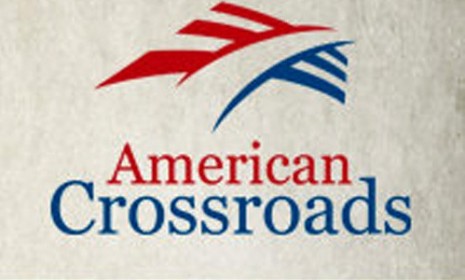Is outside money upending the midterms?
A flood of cash is washing over the 2010 election from partisan groups partly funded by anonymous donors. Is this a threat to democracy?

A free daily email with the biggest news stories of the day – and the best features from TheWeek.com
You are now subscribed
Your newsletter sign-up was successful
Independent groups partly funded by anonymous donors are raising and spending money on campaign ads "at a pace that threatens to eclipse the efforts of political parties," says The Washington Post. "The breadth and impact of these privately financed groups," adds The New York Times, "have made them, and the mystery of their backers, a campaign issue in their own right." Who are these organizations, and are they, as some claim, threatening our democracy?
What kind of groups are they?
The ones of greatest concern to neutral observers are "super PACs" — entities set up by partisan groups, such as Karl Rove's American Crossroads and the liberal women's organization Emily's List, to fund-raise on behalf of favored candidates.
The Week
Escape your echo chamber. Get the facts behind the news, plus analysis from multiple perspectives.

Sign up for The Week's Free Newsletters
From our morning news briefing to a weekly Good News Newsletter, get the best of The Week delivered directly to your inbox.
From our morning news briefing to a weekly Good News Newsletter, get the best of The Week delivered directly to your inbox.
What are super PACs?
Officially, they are "independent expenditure-only committees" that can raise limitless funds. They can spend their money on whomever they choose, as long as they don't coordinate their activities with candidates or political parties. These groups are the "clearest, easiest way to spend unlimited funds on an election," says former Federal Election Commission Chairman Trevor Potter, a Republican. The super PAC is the "holy grail" for partisan operatives.
Are donors to super PACs anonymous?
No — but some have also created nonprofit bodies, known as "510(c)(4)" companies, that do not have to declare their donors. American Crossroads, for example, has an advocacy arm called American Crossroads GPS that is registered as a 510(c)(4) and raises money from anonymous sources.
A free daily email with the biggest news stories of the day – and the best features from TheWeek.com
How much money are we talking about?
Thanks to super PAC spending, this has been the most expensive midterm election in history. So far, interest groups and political parties have reported spending a midterm record of $104 million, but the money is just beginning to flow. American Crossroads has already raised $32 million and is set to raise an additional $20 million by the end of October. The U.S. Chamber of Commerce will likely raise $75 million before the election. Both groups will spend that money mainly on ads attacking Democrats.
But both parties are doing this, right?
Yes, although groups supporting Republicans are outspending Democrat-backing groups by more than 3 to 1, according to FEC records. "Republican operatives have embraced the use of nonprofit issue groups that can keep donors' identities secret," says The New York Times.
Why are these groups appearing now?
The Supreme Court's decision in Citizens United v. the FEC earlier this year gives corporations and unions the same rights as individuals when it comes to free speech — meaning Big Business can spend as much as it likes on influencing public debate. Super PACs have emerged to help solicit those funds from corporate donors.
Are they all American donors, or is there foreign money too?
It's unclear — but that hasn't stopped the White House and the Democratic National Committee from accusing GOP-aligned groups of using "secret foreign money" to attack candidates. While there is little evidence of that, says ABC News, there is also no way to be certain, given the lack of disclosure requirements. Without proof, says The Washington Post, Obama and his team are being "irresponsibly alarmist" and xenophobic — and missing the point. The threat isn't "secret foreign money," it's "secret domestic cash," and the solution is to fix the tax code.
Does this new flood of money really threaten democracy?
Absolutely, says Robert Weissman in The Hill. Self-interested billionaires are now free to funnel entire fortunes into "attack ads from unaccountable organizations with no real membership." Thanks to Citizens United, "Wild West rules now prevail for elections... whoever has the biggest gun and most bullets will win." Not so, says David Keating, executive director of the conservative Club for Growth, which has registered as a super PAC. The new rules are "liberating" because advocacy groups can now "actually talk to people honestly" and focus on issues rather than personalities. And raising money is now "a lot easier and more on the up and up for everyone involved" — not just Republicans.
Sources: The Washington Post (2), The New York Times, ABC News, Wall Street Journal, The Hill, NPR